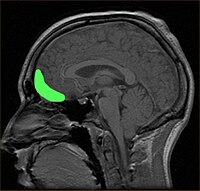
Photo from wikipedia
Abstract This study examined whether the interaction between parenting and inhibitory control predicts hyperactivity-impulsivity and inattention in 195 children. Observation data of positive parenting were collected at 4 years, and… Click to show full abstract
Abstract This study examined whether the interaction between parenting and inhibitory control predicts hyperactivity-impulsivity and inattention in 195 children. Observation data of positive parenting were collected at 4 years, and mother reports of coercive parenting at 5 years, inhibitory control at 6 years, and hyperactivity-impulsivity/inattention at 7 years were obtained. The common and unique variance of hyperactivity-impulsivity and inattention symptoms were examined as outcomes using a bifactor model. Results indicated that positive parenting practices predicted lower levels of hyperactivity-impulsivity/inattention behaviors at age 7 only when children's inhibitory control was high. These results support the vantage sensitivity model, which posits that some individuals show an increased sensitivity to positive experiences exclusively, and support the appropriateness of a targeted prevention approach in early childhood.
Journal Title: Development and Psychopathology
Year Published: 2020
Link to full text (if available)
Share on Social Media: Sign Up to like & get
recommendations!